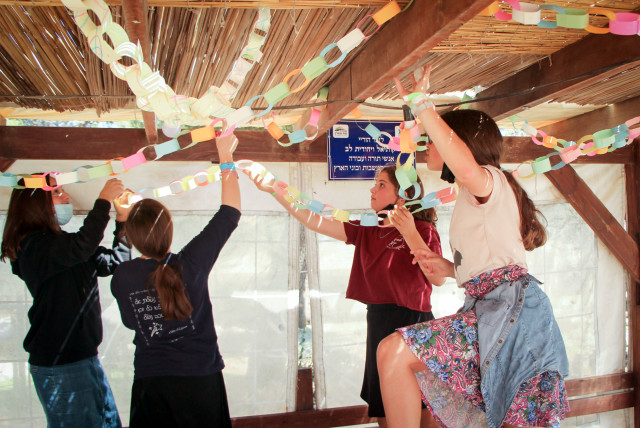Editor's Notes: The right – and wrong – way to rejoice

The simcha of Sukkot is egalitarian, collective, even universal. It should include, not exclude; embrace, not push away. Unfortunately, it seems that message was lost on some this holiday.
The weeklong holiday of Sukkot, which comes to an end this weekend, is distinguished by a particularly delightful characteristic.
While all holidays are meant to be joyous, Sukkot – and the combined holiday of Shmini Atzeret-Simchat Torah, which comes immediately thereafter and brings the Jewish holiday season to a close – has joy embedded in its very essence.
“Say to the Israelite people: On the fifteenth day of this seventh month there shall be the Feast of Booths (Sukkot) to the Lord, [to last] seven days… On the first day you shall take the product of splendid trees, branches of palm trees, boughs of leafy trees, and willows of the brook, and you shall rejoice before the Lord your God seven days.” (Leviticus 23)
“After the ingathering from your threshing floor and your vat, you shall hold the Feast of Booths for seven days. You shall rejoice in your festival, with your son and daughter, your male and female slave, the Levite, the stranger, the orphan, and the widow in your communities. You shall hold a festival for the Lord your God [for] seven days, in the place that the Lord will choose; for the Lord your God will bless all your crops and all your undertakings, and you shall have nothing but joy.” (Deuteronomy 16)
While joy is mentioned elsewhere in Deuteronomy 16, in the listing of holidays that appears in Leviticus 23 it is linked only to Sukkot. The holiday has thus come to be known as Z’man Simchatenu – the Season of our Rejoicing.
The late Rabbi Lord Jonathan Sacks reflected on the nature of simcha, the word I – like many others – have translated as “joy.”
“Simcha is usually translated as joy, rejoicing, gladness, happiness, pleasure, or delight,” he writes in Covenant and Conversation. “In fact, simcha has a nuance untranslatable into English. Joy, happiness, pleasure, and the like are all states of mind, emotions. They belong to the individual. We can feel them alone. Simcha, by contrast, is not a private emotion. It means happiness shared. It is a social state, a predicate of ‘we,’ not ‘I.’ There is no such thing as feeling simcha alone.”
Rabbi Sacks finds proof of the collective nature of biblical simcha in the fact that the verse in Deuteronomy takes an inclusive approach, stressing that “your male and female slave, the Levite, the stranger, the orphan, and the widow” are to be a part of the celebration.
“What Moses is articulating for the first time is the idea of simcha as communal, social, and national rejoicing. The nation was to be brought together not just by crisis, catastrophe, or impending war, but by collective celebration in the presence of God. The celebration itself was to be deeply moral. Not only was this a religious act of thanksgiving; it was also to be a form of social inclusion. No one was to be left out: not the stranger, or the servant, or the lonely (the orphan and widow)."
“There are many things we can achieve in the first-person singular but one we cannot, namely, simcha – because simcha is the joy we share, the joy we have only because we share,” he writes.
The inclusivity of the simcha experienced during Sukkot is so expansive, in fact, that it extends beyond the Jewish people.
The Talmud, in Tractate Sukkah, relates that 70 bulls were offered in the Temple as sacrifices throughout Sukkot, to correspond to the 70 nations of the world and seek their peace and welfare. Rabbi Meir Simcha of Dvinsk – a late 19th and early 20th century sage who lived and wrote in the Baltics – noted in his commentary on the Torah, Meshech Chochmah, that the nations of the world would join the Israelites in rejoicing during the holiday.
The haftarah (the portion from the books of Prophets chanted after the Torah reading on Shabbat and holidays) for the first day of Sukkot comes from the Book of Zechariah and envisions a time in which all nations will come to Jerusalem to celebrate the holiday – one of the three annual pilgrimage festivals: “All who survive of all those nations that came up against Jerusalem shall make a pilgrimage year by year to bow to the Supreme Lord of Hosts and to observe the Feast of Booths.”
The simcha of Sukkot is egalitarian, collective, even universal. It should include, not exclude; embrace, not push away.
Unfortunately, it seems that message was lost on some this holiday.
Racism has no place in a civil society
On Monday afternoon, as I was sitting in my office – which overlooks Yafo Street in downtown Jerusalem – I overheard some loud chanting coming from the light rail station below. I walked over to the window just as the doors of a train were closing, drowning out the chants.
Several hours later, I saw a video on X (formerly Twitter) of that very moment, taken from inside the train; my office window is visible in the background.
In it, a group of young men clad in the yellow-and-black paraphernalia of the Beitar Jerusalem soccer team are seen hollering a chant about Salim Tuama, an Arab Israeli athlete who used to play for Beitar’s archrival, Hapoel Tel Aviv.
“This is the Land of Israel, Tuama. This is the state of the Jews. I hate you, Salim Tuama, I hate all the Arabs,” they sang, before moving on to another song favored by some of the team’s fans: “They called me violent. They also called me racist…” That song was cut off by a young man who shouted, “Today I’m proving that I’m both,” before dissolving into giggles.
Seconds later, that very same individual led the group in a Sukkot song paraphrasing the verse from Deuteronomy: “You shall rejoice in your festival… and you shall have nothing but joy.”
The juxtaposition of the two – a string of racist chants followed by a song about an inclusive holiday meant to be shared with other nations – could hardly have been more jarring.
Earlier that very same day, a group of Asian Christian pilgrims were carrying a large wooden cross out of the Church of the Flagellation in the Old City when a succession of Jewish men and boys – some of them carrying the Four Species associated with Sukkot – leaned over and spat at their feet as they walked by.
That incident drew widespread attention and condemnation, including by both President Isaac Herzog and Prime Minister Benjamin Netanyahu, who said that the government “will show zero tolerance against those who harm worshipers.”
“Offensive behavior toward worshipers is a desecration and is unacceptable. Israel is fully committed to safeguarding the sacred right of freedom of worship and pilgrimage to the holy sites of all faiths,” Netanyahu said.Elisha Yered, a far-right activist who used to serve as an aide to Otzma Yehudit Member of Knesset Limor Son Har-Melech – a member of the current coalition – struck a different tone.
“The custom of spitting near churches or monasteries is an ancient Jewish tradition,” he wrote on X.
“Perhaps, influenced by Western culture, we have somewhat forgotten what Christianity is, but I suspect the millions of Jews in the Diaspora who experienced Crusades, torturous Inquisitions, blood libels, and mass pogroms will never forget,” he added.
The notion that Jews empowered by modern-day sovereignty can or should prey on innocent Christians as payback for centuries of Christian persecution is utterly repulsive, and the fact that the attackers in the Old City did so while clutching the symbols of Sukkot should horrify anyone who understands the true meaning of the holiday.
According to Rabbi Sacks, it is no coincidence that the Torah repeatedly mentions the importance of simcha in Deuteronomy, as the Israelites are about to enter the Land of Israel after a long and arduous journey.
“What [Moses] tells [the Israelites] is unexpected, counterintuitive,” he writes. “In effect he says this: ‘You know what your parents suffered. You have heard about their slavery in Egypt. You yourselves have known what it is to wander in the wilderness without a home or shelter or security. You may think those were the greatest trials, but you are wrong. You are about to face a harder trial. The real test is security and contentment.’”
“Suffering, persecution, a common enemy, unite a people and turn it into a nation,” he continues. “But freedom, affluence, and security turn a nation into a collection of individuals, each pursuing his or her own happiness, often indifferent to the fate of those who have less, the lonely, the marginal, and the excluded. When that happens, societies start to disintegrate. At the height of their good fortune, the long slow process of decline begins.
“The only way to avoid it, said Moses, is to share your happiness with others, and, in the midst of that collective, national celebration, serve God. Blessings are not measured by how much we own or earn or spend or possess but by how much we share. Simcha is the mark of a sacred society. It is a place of collective joy,” Rabbi Sacks concludes.
As the Jewish holiday season draws to a close, we ought to consider the universal resonance of that profound social message. Simcha shared only with those who are part of your circle, your community, or even your nation is incomplete, and when it comes at the expense of the other it is as though it doesn’t exist at all. There is no such thing as chauvinist, exclusivist, or isolationist simcha. It is inherently inclusive, embracive, and shared.
May our joy, during this season and throughout the year, always be so.
Chag same'ach.
Jerusalem Post Store
`; document.getElementById("linkPremium").innerHTML = cont; var divWithLink = document.getElementById("premium-link"); if (divWithLink !== null && divWithLink !== 'undefined') { divWithLink.style.border = "solid 1px #cb0f3e"; divWithLink.style.textAlign = "center"; divWithLink.style.marginBottom = "15px"; divWithLink.style.marginTop = "15px"; divWithLink.style.width = "100%"; divWithLink.style.backgroundColor = "#122952"; divWithLink.style.color = "#ffffff"; divWithLink.style.lineHeight = "1.5"; } } (function (v, i) { });

